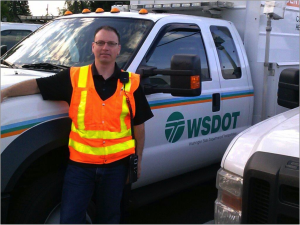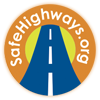Headlights on… Ken Buretta
 Current Company: Washington State Department of Transportation (WSDOT)
Current Company: Washington State Department of Transportation (WSDOT)
Department: Traffic Operations, Incident Response Team (IRT)
Position/Title: IRT Lead Tech
How has your background prepared you for your position on the Washington DOT Incident Response Team?
By working in Maintenance and Operations and learning traffic control at WSDOT has placed me in many different traffic control situations and allowed me to see how proper traffic control can minimize traffic congestion.
Why did you pursue a position on the Incident Response Team?
I love to help people and make a difference every day. I started out as an IRT back-up driver and was hooked.
What type of training did you undergo for this position?
I first had to pass a criminal history background check. We are also required to possess a Class B Commercial Driver’s License (CDL). Then we receive Washington State Patrol (WSP) radio training, crime scene awareness and evidence preservation training and EVOC Defensive Driver at the WSP Training Academy. We also have a ride along with a Trooper.
In addition, we receive WSDOT Traffic Management Center training. Most IRT tech’s have a minimum of 2 years in maintenance and operations where we learn flagging and handling traffic control. We have IRT Standard Operating Guidelines training. We spend several days on ride along with an IRT trainer to make sure we are aware of hidden dangers and are using emergency lights and sirens appropriately. We train on how to safely contact drivers of disabled vehicles and with an injured motorist at a collision scene.
As a lead tech, I received training on dealing with employees in the work place and setting the right example for your team.
In your opinion, what are the most important qualities and skills a member of the Incident Response Team should possess?
The job requires a willingness to help others and to have a positive attitude. You have to be a take charge person who can make quick decisions, yet still be calm in times of stress.
In the feature article of this issue, Safe Highway Matters explores the nomenclature for the men and women, who patrol the roadways daily, provide assistance to stranded motorists, remove debris from the road, and manage traffic at incident scenes. What title do you designate to be the best fit for your position: drivers, operators, rangers, officers, other? Why?
Technicians – I consider what I do to be very technical. What the members of my Team do on a daily basis is truly amazing. They may help a stranded motorist change a flat tire one minute and put out a car fire the next. They will open highways with whatever means necessary. We will push pull or drag anything that is blocking a lane or ramp to get it back open. They will get it done. They are so well rounded in there training that I don’t think there is anything they can’t handle. Without the quick thinking of these technicians traffic would be a mess resulting in more collisions and congestion.
How does your position title impact your work on the Incident Response Team?
I am an IRT Lead Technician and have a responsibility to supervise my team to make sure that they have the tools and the training they need to safely accomplish their work. We work closely with out Traffic Incident Management partners including the WA State Patrol Field Operations Bureau and Communications Centers, WSDOT’s Traffic Management Center, local Fire/Rescue and EMS, etc. to ensure responder safety and facilitate a safe, quick clearance of the incident.
Washington DOT Incident Response vehicles are classified somewhat differently from most other state’s assistance patrols, as yours are officially designated as “emergency first responders,” in the same classification as ambulances. How does that designation allow you to perform your role more effectively?
Our drivers and vehicles are vetted through the WSP and then issued an Authorized Emergency Vehicle Permit. This designation allows us to operate emergency response equipment including red lights and sirens. We are also dispatched by WSP to roadway incidents thus freeing the Troopers to perform some of their other duties.
Our IRT program motto is “Clearing Roads. Helping Drivers.” This simple phrase really captures the work that we do – Clearing Roads represents theEmergency Response aspects of our work. If a travel lane or ramp is blocked, it is an emergency and we have that response capability. Helping Drivers represents all the motorist assistance services we provide.
We have a Joint Operating Policy Statement agreement with the WSP and the WA Fire Chiefs that outline how we work collaboratively to clear roadway incident.
What challenges do you face as a patrol operator?
Traffic is the number one threat to my team. There is a potential threat of being struck every time a technician exits their IR truck. Every day we tell each other “Be safe out there.” You always have to have one eye on traffic because you may have only one chance to escape.
What do you like best about your job?
The best part of my job is helping people in need.
What was your most significant/most daring assist?
I arrived to the scene of a child caught in a seat belt panicking out of control. After she was freed I checked on a disabled just to the rear of their car. The vehicle was in reverse with a nonresponsive driver. I placed my truck to the rear of the car to keep it from backing into a 70 MPH freeway. After calling for aid and WSP I was able to wake the driver. He opened the door and I quickly placed the car in park and removed the keys because he said he would just drive on. I could tell that this elderly gentleman was disoriented so I told him that aid was on their way and would check him out for his own safety. When aid arrived they checked him out. A WSP trooper administered field sobriety test to the driver which he failed and was arrested for DUI. I can’t help but think what would have happened if he would have drifted out on the highway in reverse. That van full of kids could have been injured or killed.
What’s one rule of thumb you think all patrol drivers could benefit from following?
Never assume a driver is going to understand your traffic control and act accordingly.
What would you like to know about other state’s Safety Service Patrols?
Do they work with and/or are they dispatched by their state police?
What would you like other states to know about the Incident Response Team?
If you do not have IRT then I think you are missing out on a great opportunity. The men and woman of our teams provide a valuable service to the motorists who travel on our state highways. We are out helping drivers making it safer for the traveling public. Because we are out helping drivers and clearing roads of debris the State Patrol can focus on other things. We are out here ready to respond to collisions and set up traffic control to keep all emergency responders and the motoring public safe.
Thanks for the opportunity to share some information about myself and our program with you.
